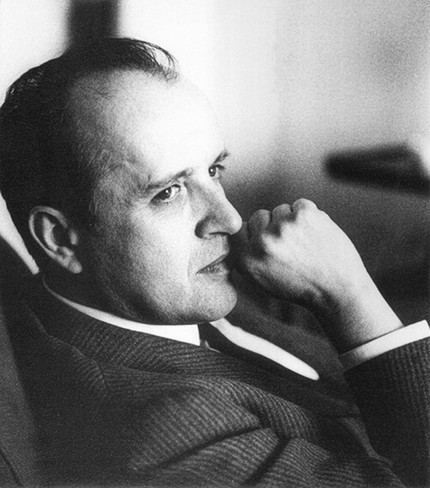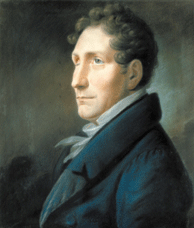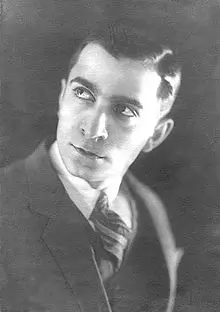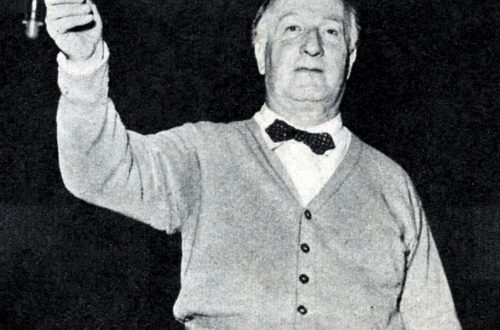
Nino Rota |
Nino Rota

Nino Rota: he also wrote operas
Friday 10 April is declared a day of mourning in Italy. The nation mourned and buried the victims of the devastating earthquake. But even without a natural disaster, this day in the history of the country is not without sorrow – exactly thirty years ago the composer Nino Rota passed away. Even during his lifetime, he gained worldwide popularity with his music for the films of Fellini, Visconti, Zeffirelli, Coppola, Bondarchuk (“Waterloo”). Without a doubt, he would have become famous if he had written music for only one of dozens of films – The Godfather. Only a few outside of Italy know that Nino Rota is the author of ten operas, three ballets, symphonies and chamber works. Even fewer people are familiar with this side of his work, which he himself considered more important than film music.
Nino Rota was born in 1911 in Milan into a family with deep musical traditions. One of his grandfathers, Giovanni Rinaldi, was a pianist and composer. At the age of 12, Nino wrote an oratorio for soloists, orchestra and choir “Childhood of St. John the Baptist”. The oratorio was performed in Milan. In the same 1923, Nino entered the Milan Conservatory, where he studied with the renowned teachers of the time, Casella and Pizzetti. He wrote his first opera Principe Porcaro (The Swineherd King) based on Andersen’s fairy tale at the age of 15. It has never been orchestrated and has survived to this day in sheet music for piano and voice.
Rota’s real debut as an operatic composer took place 16 years later with the opera Ariodante in three acts, which the author himself described as “an immersion in the melodrama of the 19th century.” The premiere was planned in Bergamo (Teatro delle Novit), but because of the war (it was 1942) it was moved to Parma – this “abode of melodramas”, in the words of the literary and music historian Fedele D’Amico. The audience enthusiastically greeted the opera, where both the composer and the performer of one of the main parts made their debut – a certain Mario del Monaco. Each time at the end of the performance, they were attacked by a crowd of people who wanted to get autographs.
The success of Ariodante among the demanding audience of Parma inspired the composer to create the opera Torquemada in 1942 acts in 4. However, wartime circumstances prevented the premiere. It took place thirty-four years later, but did not bring great laurels to the already eminent and popular composer. In the last year of the war, Nino Rota worked on another great operatic work, which, again, was forced to put in a drawer and forget about it for a long time. More on this piece below. Thus, the second opera performed was the one-act comedy “I dui timidi” (“Two Shy”), conceived for the radio and first heard on the radio. Awarded a special prize Premia Italia – 1950, she later walked on the stage of the Scala Theater di Londra under the direction of John Pritchard.
The real success came to the composer in 1955 with the opera “Il capello di paglia di Firenze” based on the famous plot of “The Straw Hat” by E. Labichet. It was written at the end of the war and lay on the table for many years. The opera marked the peak of the composer’s popularity as the creator of opera classics. Rota himself would hardly have remembered this work if it were not for his friend Maestro Cuccia, to whom the author played the opera on the piano immediately after the completion of the work in 1945, and who remembered it 10 years later, having taken the post of head of the theater Massimo di Palermo. Cuccia forced the author of the opera to find the score, shake off the dust and prepare for the stage. Rota himself admitted that he did not expect the triumph with which the opera passed through the stages of a number of leading theaters in Italy. Even today, “Il capello” remains, perhaps, his most famous opera.
In the late fifties, Rota wrote two more radio operas. About one of them – the one-act “La notte di un nevrastenico” (“The Night of a Neurotic”) – Rota spoke in an interview with a journalist: “I called the opera a buffo drama. In general, this is a traditional melodrama. While working on the work, I proceeded from the fact that in a musical melodrama, music should prevail over the word. It’s not about aesthetics. I just wanted the performers to feel comfortable on stage, to be able to show their best singing abilities without difficulty.” Another opera for radio play, the one-act fairy tale “Lo scoiattolo in gamba” based on the libretto by Eduardo de Filippo, went unnoticed and was not staged in theaters. On the other hand, Aladino e la lampada magica, based on the well-known fairy tale from the Thousand and One Nights, was a great success. Rota worked on it in the mid-60s with the expectation of a stage incarnation. The premiere took place in 1968 in San Carlo di Napoli, and a few years later it was staged at the Rome Opera by Renato Castellani with scenery by Renato Guttuso.
Nino Rota created his last two operas, “La visita meravigliosa” (“An amazing visit”) and “Napoli Milionaria”, at an advanced age. The last work, written based on the play by E. de Filippo, caused conflicting responses. Some critics responded sarcastically: “a veristic drama with sentimental music”, “a dubious score”, but the majority leaned towards the opinion of the authoritative critic, writer, poet and translator Giorgio Vigolo: “this is a triumph that our opera house has been waiting for for many years from a modern composer “.
It should be noted that the operatic work of the Italian composer is still an object of discussion and controversy. Without questioning Nino’s outstanding contribution to film music, many consider his operatic heritage as “less significant”, reproach him for “insufficient depth”, “lack of the spirit of the times”, “imitation” and even “plagiarism” of individual musical fragments. A careful study of the opera scores by experts shows that Nino Rota really was seriously influenced by the style, form, and musical phrasing of his great predecessors, primarily Rossini, Donizetti, Puccini, Offenbach, as well as his contemporary and, according to various sources, friend Igor Stravinsky. But this does not in the least prevent us from considering his operatic work as completely original, occupying its own place in the world musical heritage.
Quite absurd, in my opinion, are reproaches of “vulgarity”, “opera lightness”. With the same success, you can “criticize” many of Rossini’s works, say, “Italian in Algiers” … Rota did not hide the fact that, deifying Rossini, Puccini, the late Verdi, Gounod and R. Strauss, he loved classical operettas, American musicals, enjoyed Italian comedies. Personal affections and tastes, of course, were reflected in the “serious” genres of his work. Nino Rota often repeated that for him there is no value, “hierarchical” difference between music for cinema and music for the opera stage, concert halls: “I consider artificial attempts to divide music into” light “,” semi-light “,” serious … The concept of “lightness” exists only for the listener of music, and not for its creator… As a composer, my work in cinema does not humiliate me at all. Music in cinema or in other genres is all one thing for me.”
His operas rarely, but still occasionally appear in the theaters of Italy. I could not find traces of their productions on the Russian stage. But only one fact of the composer’s popularity in our country speaks volumes: in May 1991, a big concert dedicated to the 80th anniversary of the birth of Nino Rota was held in the Column Hall of the House of the Unions, with the participation of the orchestras of the Bolshoi Theater and State Radio and Television. Readers of the middle and older generations remember what a severe economic and political crisis the country was going through at that time – six months remained before its collapse. And, nevertheless, the state has found means and opportunities to celebrate this anniversary.
It cannot be said that the Italian composer has been forgotten in the new Russia. In 2006, the premiere of the play “Notes by Nino Rota” was held at the Moscow Theater of the Moon. The plot is based on nostalgic memories of an elderly person. Scenes from the hero’s past life alternate with episodes and motifs inspired by Fellini’s films. In one of the theatrical reviews for April 2006 we read: “His music, distinguished by rare melody, lyricism, richness of invention and subtle penetration into the film director’s intention, sounds in a new performance based on dance and pantomime.” We can only hope that by the composer’s centenary (2011), our opera masters will remember that Nino Rota worked not only for cinema, and, God forbid, they will show us at least something from his operatic heritage.
The materials of the websites tesionline.it, abbazialascala.it, federazionecemat.it, teatro.org, listserv.bccls.org and Runet were used for the article.





